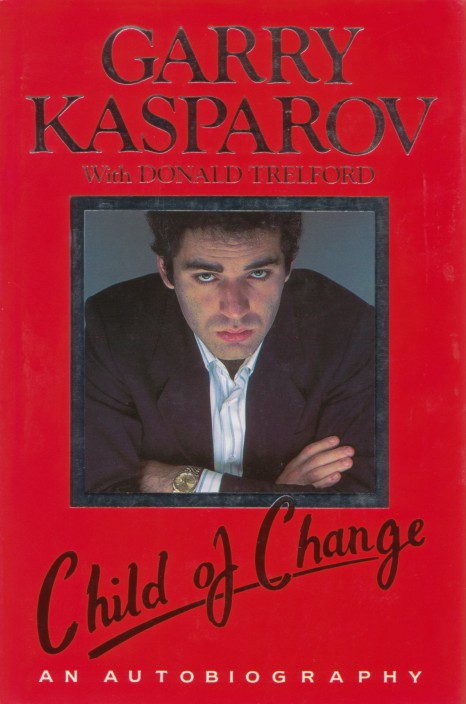
Edward Winter

Child of Change by Garry Kasparov with Donald Trelford (published by Hutchinson) is, technically, a highly professional piece of work which is sure to be a best-seller. ‘Never before has a Soviet superstar spoken so frankly and openly about his life and ideas ...’, says the dust-jacket. The book is everything one has come to expect of Kasparov: passionate, supercharged and challenging, yet immature, speculative and deceptive.
For some reason journalists have always refrained from asking him awkward questions. Interviewers bounteously purvey opportunities for him to attack his supposed enemies, and Kasparov can deliver a headline-snatching diatribe at the drop of a leading question. But his squalls are those of a man unaccustomed to being contradicted and unaware that ‘freedom of expression’ involves the responsibility of trying to get things right. Before examining in detail Kasparov’s new book, it is worthwhile looking at an extract from a typical interview. It appeared on page 38 of Le Figaro of 28 April 1987:
‘Question: Who would you not like to see act as chief arbiter and members of the appeals jury in your forthcoming World Championship match?
Kasparov: I don’t have any personal enemies, but I do not approve of people who compromise themselves. Since childhood I have always been hostile to any kind of Fascism. I would therefore like to have persons above reproach, without criminal ties with FIDE’s Fascist method of operating. This kind of Fascism is unacceptable. A human being is born with his own brain and heart, and he has to be entitled to freedom of expression, in the democratic way. Human rights have to be respected.
Question: Aren’t you afraid that the “forces” which you often criticize may be used against you in one way or another?
Kasparov: What forces? They are like zombies, ghosts, or ogres in fairy tales. They have gone away for good, like witches on their flying broomsticks. This is 1987, not 1985. Everything that Mikhail Gorbachov has been saying is what I’ve been doing for the past two years already. No matter how much some might regret the past, it’s gone forever. These people are clinging to their old privileges, but they don’t measure up in front of a chessboard.’
Instead of pressing Kasparov to explain words like ‘criminal’, ‘corruption’ and ‘Fascist’, journalists nod and publish. It makes good copy. If Kasparov were asked to identify the members of the oft-mentioned ‘international mafia’, it would spoil all the fun.
After getting away with such interviews for years, Kasparov could hardly be expected to produce a dialectical autobiography. Despite its repeated use of the word ‘truth’, Child of Change is the careless and untrustworthy book that all the cosily venomous interviews presaged. Kasparov refuses, or is unable, to supply evidence, and bases his assertions on malevolent guesswork; as early as page 3 he describes the ‘day of shame in the history of chess’ (15 February 1985, Termination Day):
‘There was an unscheduled and unexplained delay. At one point on the video, which I often play back to myself, there is a revealing camera shot of a Soviet official peeping through the curtains to check that I really was there in the audience, for this meant they had to change their plans and announce something different from what they had intended to say.’
The obvious questions here are how Kasparov knows what this peeper was doing and thinking, and what evidence he has for the change-of-plan charge. Although this anonymous figure behind the curtains could just have been counting heads for lunch, he manages to obsess Kasparov, who goes over the same ground again on page 134:
‘There is a video of all this, made by the American network ABC, who gave me a copy. I look at it whenever I feel the need to get fired up again about Campo and the others who have tried to get in my way. The cameras were rolling as soon as I arrived, before the press conference itself. It recorded the chaos caused by my arrival, including a most revealing shot of someone peeping through the curtains to make sure, when the bad news reached them, that I was really there.’
A subsidiary point here: how strange that Kasparov, whose book evinces a loathing for everything Campomanes says and does, still has to resort to artificial anger-inspiring stimulants such as an old VCR. A bonus when he feels ‘the need to get fired up’ is the availability of a freeze-frame function on his video recorder: ‘Every time I freeze Campo’s face on the screen at that moment, his expression that of a hunted ferret, ...’ (page 3). After such disclosures it will be no surprise if Reuben Fine rushes out a new edition of The Psychology of the Chess Player.
The book contains a hundred and one pieces of truculence and vituperation. A typical piece of ‘reasoning’ is on page 202, concerning the 16th game of the third Karpov match:
‘As I made the killing pawn-thrust against his king at move 41, I caught sight of Karpov’s tall blonde girl friend, Natasha, hurrying out of the hall. It was rumoured that he had promised to marry her when he regained the world title, which may have accounted for her sudden departure when once again she saw the prospect of wedlock receding. They have since got married, which may suggest that they are tired of waiting.’
Leaving aside the question of the real move (his 41st was not a pawn thrust), one notes Kasparov’s reliance on rumours, and the illogicality of his have-it-both-ways final sentence. It is just one of countless instances of barrel-scraping. Throughout the book, he displays an unpleasant liking for infantile name-calling. For example, by page 213 the ‘hunted ferret’ is smiling ‘like a cunning Cheshire cat’. (Incidentally, on page 135 Kasparov even argues that running the World Championship is what the FIDE President ‘mainly exists to do’. Hardly.)
Kasparov’s technique is to attack so hard that defence will not be necessary. Whether through foolishness or naivety, he seems unaware that his harangues about the need for truth and sincerity in the chess world will cut little ice so long as he attacks unscrupulously and undiscerningly (the old ‘Campomanes’ gold mine in South Africa’ accusation, now refuted, has been quietly buried without an apology) and as long as he continues his political and literary associations with individuals (one individual in particular) whose untruths can be, and have been, repeatedly proved as a matter of public record.
The greatest gulp and guffaw provided by the book comes on page 125, when Kasparov comments regarding the Termination:
‘The final truth about this match, I believe, is as Grandmaster Keene reported it.’
Having said something nice about Grandmaster Keene, he proceeds (as on many occasions in the book) to quote Grandmaster Keene saying something nice about him. Naturally, there is not a word about Grandmaster Keene’s telex to Campomanes advocating termination, or all the concomitant falsehoods and inconsistencies (such as those which have been documented in Chess Notes). That is the other side of Kasparov’s technique: no sense of obligation to mention, let alone try to refute, awkward facts. To give just one more example: during the 1986 FIDE presidential campaign, the FIDE Facts sheets played a vital role in destroying the credibility of the challengers Keene/Lucena, by accurate and fair quotation of their own words. Kasparov, of course, does not dare attempt a rebuttal of the arguments, and makes do, on page 212 with a vague, unsubstantiated reference to the distribution of ‘material about Lucena in a form that was virtually unreadable’. (On the same page we see with what good grace Kasparov accepted three gold medals at the Dubai Olympiad: ‘As my medals were presented to me they felt like pieces of tin rattling round the neck of a dog.’)
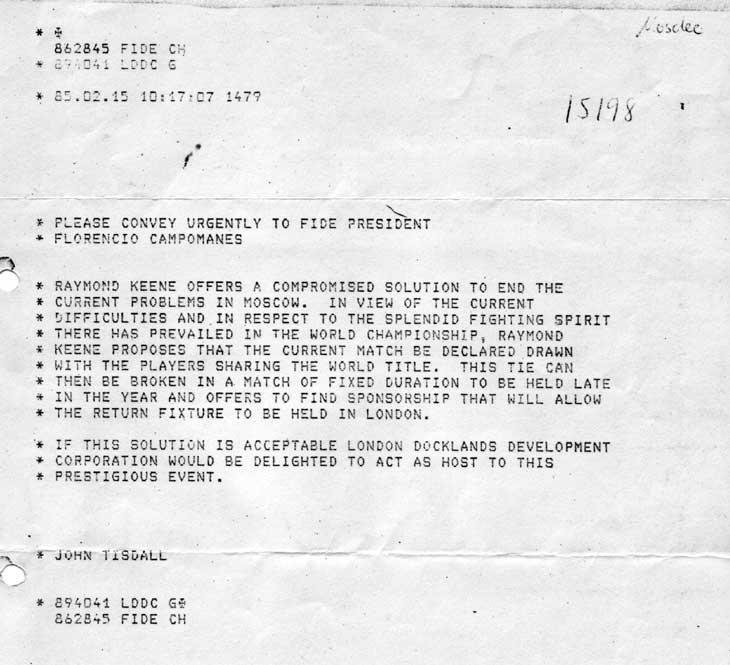
His treatment of the Termination episode contains little in the way of facts (‘The full story may never be known, because there were many conversations in which I never took part – from which, in fact, I was carefully excluded – and which the participants will doubtless want to keep secret ... I set out my own theories below.’ – page 127). And that is what they are: theories or slanted conjecture. His views on Karpov’s state of health towards the end of the match are peculiar and self-contradictory. On page 124 he rejects the claim that Karpov was sick, emphasizing the quality of game 48, and on page 143 he writes: ‘The people around him [Karpov] attributed my late victories to the fact that he was so exhausted, but Karpov knew better. He knew it was my chess that was beating him.’ But on page 125 Kasparov states that his opponent ‘had exhausted his strength’, and on page 130 says that ‘Karpov was in no state to go on without the serious risk of defeat’. One can appreciate Kasparov’s quandary; going too far down the ‘Karpov ill’ road would devalue his own achievement of winning games 47 and 48. Despite that, Kasparov confirms that he himself was the one to call a time-out on 11 February ‘because I needed it ... after all the excitement, I needed time to draw breath’ (pages 131-132), although it is hard to understand why if he really thought his opponent was ‘in no state to go on’.
Kasparov confirms his earlier declarations that ‘I would have been ready for an end to the match right at the start of the negotiations – if they had accepted me as an equal partner and had offered me acceptable terms’ (page 128), but later approvingly quotes Raymond Keene’s statement that ‘no decision was necessary, since the match was proceeding according to regulations and these should have been allowed to run their course’ (page 155). On page 133, he writes: ‘I assumed the original FIDE proposal – to stop now and start afresh in September – was what we were talking about. In a way this wasn’t so bad for me. I was sure I would win the second match. I had become much wiser than at the beginning of this one. And to start playing again at nil-nil was better than five-three against.’ Isn’t that what happened?
The crucial discrepancy or misunderstanding is again shown to have occurred in the early-February meeting between Kasparov and Kinzel, who have given divergent accounts of the circumstances in which Kasparov stated he would accept immediate termination of the match. Borrowing Timman’s comment (without acknowledgement), Kasparov writes (page 129): ‘Because I offer a draw at five-two it doesn’t mean that Karpov can accept it later when the score becomes five-three.’ One could retort that Karpov didn’t ‘accept it’, but the central point here is that a willingness at five-two to entertain the possibility of termination can hardly be transferred into outright rejection of the principle just because one further game has gone in his favour. Kasparov says that his statement to Kinzel was ‘a tactical mistake’ (page 128) and reveals (page 130) his ‘entirely reasonable’ counter-proposals to Kinzel for stopping the match: ‘Karpov should renounce his world title, and he should declare that he was at the end of his physical resources.’ Campomanes has been much criticized for judging health questions without consulting a doctor. Whom did Kasparov consult?
It is now established that when Kinzel wanted to telephone Campomanes in Dubai he used Gligorić as an interpreter since he had no common language with the FIDE President. At first, it will be recalled, the Keene/Goodman/Batsford movement falsely claimed that Karpov, or Karpov’s camp, had made the call. Although Kasparov (page 131) accepts that it was Gligorić who telephoned, he remarks that an arbiter should not have ‘initiated moves’ of this kind. For that argument to have any weight it is necessary to conceal the fact that Gligorić acted as an interpreter. Kasparov conceals it.
On Termination Day, however, few knew that all these discussions had been going on for over two weeks. In particular, hardly anyone was aware of the Kinzel-Kasparov negotiations. This promoted the widespread impression that Campomanes’ decision was ‘arbitrary’, and the FIDE President did little to help quell suspicions. Neither the question of whether Campomanes was right or wrong to stop the match (our own agnosticism has never been firmer) nor the repeated falsehoods written by his opponents in their press monopoly outlets can alter the fact that Termination Day in Moscow was a shambles for which Campomanes must take full blame.
Page 135 records the scene after Campomanes’ press conference announcement that a new match would start from scratch in September 1985:
‘There was a great deal of shuffling and noise in the audience at this news. The video tape shows my trainers and myself talking and laughing among ourselves.’
The question here is why it does not show Kasparov red with rage. Only later, when Karpov joined Campomanes on the platform, did Kasparov show anger, claiming that the occasion was being stage-managed.
At the subsequent private meeting, Kasparov reports (page 142), ‘Karpov didn’t want to sign’ a document agreeing to stop the match, but was persuaded to do so by Sevastyanov (or Sevestyanov, as the book spells his name). Back in front of the cameras, Campomanes announced that Karpov ‘accepted’ the termination decision (while Kasparov ‘abided’ by it). Kasparov quotes this on page 143, yet by page 147 and page 148 there is a distortion even less subtle than most of the others in this sorry book: he misquotes Campomanes as having said on that occasion that ‘Karpov supports the decision’. Thus Kasparov replaces ‘accepts’ (a word whose connotations are neutral or, even, imply reluctance) by ‘supports’ (a word which indicates positive agreement, and therefore more useful for Kasparov’s side of the story). ‘But remember: Karpov supported it [the decision]’, he emphasizes on page 149, compounding the error.
Kasparov’s account does not dispute – but nor does it acknowledge – that Campomanes rejected the USSR Chess Federation’s request (dated 13 February) for a suspension of the match, and also dismissed the ridiculous termination conditions apparently suggested at one stage by Karpov (pages 128-129). Yet Kasparov still says (page 149) that ‘the match was ended artificially totally in accordance with Karpov’s wishes’.
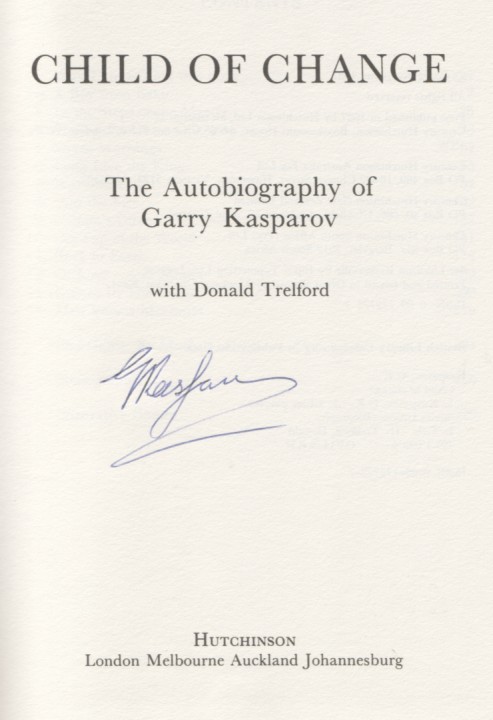
Here is a further piece of distortion from Kasparov, where, for once (page 149), he refers to documentary evidence, Karpov’s letter to Campomanes (dated 19 February 1985):
‘In his letter to Campomanes, Karpov says something that is certainly true: “ ... he [Kasparov] is displeased because he was intentionally [my italics] deprived of the right to compete for the world title.” He couldn’t have put it better.’
The reader is thus given to understand that Karpov was agreeing with the validity of Kasparov’s grievance. But what Karpov really wrote to the FIDE President was rather different:
‘As you know on February 15 1985 both the players have expressed their strong wish and ability to continue playing till the final result provided for in the regulations approved by the FIDE Congress. For me, personally, this possibility is necessary in order to once again prove my adherance [sic] to the principles of sports competition over the chessboard. The challenger has his own arguments: he is complaining of being deliberately deprived of his right to compete for the highest title.’
Source: photocopy of Karpov’s letter, which appeared as Annex 10 (4) to the FIDE Circular Letter of 11 March 1985. Conclusion: Kasparov has taken the phrase out of context and altered the wording according to his own exigencies.
Other points, briefly. The autobiography wastes considerable space on general historical snippets which will be familiar to almost everybody. Even Pillsbury’s list of memorized words is re-served (page 82), as is the untrue statement (page 108) that Capablanca fell asleep during the 1927 match with Alekhine. A rare spelling, or proof-reading, error: the author of The Queen’s Gambit was Walter Tevis, not Trevis (page 50), while on page 124 the title of Karpov’s Learn from Your Defeats book is given incorrectly. The absence of an index is a serious omission.
Some of the early chapters of Child of Change are interesting, and there is a rich selection of old photographs from the family album. No doubt a paperback edition will appear in due course, but if Kasparov really wishes to continue beating the glasnost/truth drum, this book will need to be rewritten from cover to cover.
This review was published in 1987 (C.N. 1491) and may be read in conjunction with our more general article on the Termination. When the review was published on pages 220-226 of Chess Explorations we added two endnotes (on pages 270-271). The first concerned the telephone call received by Campomanes:
Attempting in the February 1988 Chess Life (page 34) to account for his claim that the call to Campomanes had been from Karpov’s camp, Raymond Keene took advantage of a handy misquotation of that claim (by David Goodman, his brother-in-law) and defended the deformed version rather than his actual original words. (C.N. 1568)
Equally guileful (bearing in mind that for several years Kasparov’s associates refused to acknowledge that Gligorić, and not Karpov’s camp, had made the call) is the subsequent comment by Kasparov on page 122 of Unlimited Challenge: ‘Gligorić could not deny that it was he who made the call because this can be confirmed by independent witnesses.’
A point from C.N. 1348 may also be noted here. Kasparov declared in the Sunday Times magazine of 10 August 1986, page 50: ‘I am a quiet, simple person. I accept everything: I think that whatever happens is always for the best.’
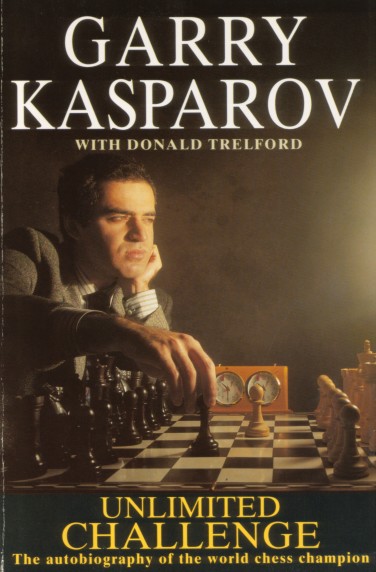
The text of the second endnote was as follows:
In an interview with Dirk Jan ten Geuzendam published in the 1/1990 issue of New in Chess Kasparov was asked (page 49): ‘You just mentioned Donald Trelford, the ghost-writer of your controversial autobiography Child of Change. What are your views on this now?’ Kasparov replied:
‘I have now finished my [emphatically] real autobiography, written by me, in Russian, and it is called Unlimited Challenge. It is based on Child of Change, but about 90% is new stuff ... This is the real Kasparov, without any English editors. I deserved the critical reception of Child of Change. I was too light-hearted, I did it just in between, which was very bad. I think that from a historical point of view the book was absolutely right, but the way it was presented was very bad. That was a mistake, which we can rectify. But the idea of the book I’m going to defend till the end.’
The new book to which Kasparov was referring in his interview was Bezlimitny Poyedinok (Moscow, 1989). In late 1990 Unlimited Challenge (‘The autobiography of Garry Kasparov with Donald Trelford’) was published by Fontana/Collins and described as a ‘revised and updated edition’ of Child of Change. In the introduction (page 5) Kasparov wrote, ‘What is the use in simply calling someone a coward, spy, mafioso or bribe-taker? Far more important for the reader are the documents, the facts, logic and a clear-cut argument.’ The book fell way short of these laudable sentiments.
Below is how we quoted the ‘critical reception’ remark by Kasparov in C.N. 3027:
When Kasparov’s ‘autobiography’ Child of Change was published in late 1987 C.N. 1491 (see pages 220-226 of Chess Explorations) gave it an unenthusiastic review which unquestionably represented, at the time, a minority position among chess writers. Within about two years (New in Chess, 1/1990 issue, page 49) Kasparov himself (whilst defending ‘the idea’ of the book ‘from a historical point of view’) was to acknowledge that the project had indeed gone wrong:
‘I deserved the critical reception of Child of Change. I was too light-hearted, I did it just in between, which was very bad.’
In October 1987 Pergamon Press published London-Leningrad Championship Games by G. Kasparov, translated by Kenneth P. Neat. The 24 games (especially the sixteenth) have impressively deep notes; which other world champions have ever offered the public such a detailed explanation of their play? It is particularly instructive to read Kasparov’s (mainly negative) views on other commentators’ annotations.
There is relatively little off-the-board comment, but enough to underline what Child of Change has already shown: Kasparov has precious little regard for truth, accuracy, consistency or fairness. One example will suffice. As is well known, after losing three consecutive games to Karpov, Kasparov accused Vladimirov, his second, of treachery. He repeated his denunciation, at length, on pages 203-208 of Child of Change. A couple of sample extracts follow:
‘... the logic of the way things developed then, prove, to my mind though Vladimirov denies it – that I was betrayed ...’ (page 204)
‘I have often wondered what drove Vladimirov to behave as he did ... The motive, I think, was a twisted kind of jealousy ... He was having to live through me. I was achieving the sort of success he craved for himself and which he thought his own talents deserved. Deep down he resented my success. He thought it should be his. This kind of feeling makes a man a natural traitor, especially if it is allied to a weak personality with a tendency to self-degradation.’ (page 205)
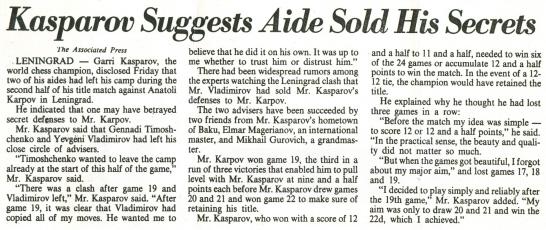
International Herald Tribune, 11-12 October 1986
Kasparov has never offered proof, and fawning journalists have never demanded any. But now, having destroyed Vladimirov’s reputation, the same Kasparov has the gall to write on page 113 of London-Leningrad Championship Games:
‘... a serious conflict occurred in my relations with Vladimirov after the 19th game. To me he seemed to be behaving strangely – copying out the analysis of openings employed in the match. I cannot assert anything, and I have no grounds for accusing him, but equally I can no longer trust Vladimirov as I used to.’
Note those words carefully:
‘... I cannot assert anything, and I have no grounds for accusing him ...’
Our admiration for Kasparov’s chess skill is immeasurable, but the rest fills us with revulsion.
(1514)
On page 198 of Deep Thinking, written with Mig Greengard (New York, 2017), Kasparov referred to the matter in more measured terms.
From page 12 of Showdown in Seville by Raymond Keene, David Goodman and David Spanier (London, 1987):
‘The climax of Child of Change, as expected, was a detailed and well-documented critique of Campomanes’ decision to stop Kasparov’s first world championship duel with Karpov.’
A few extracts from Tim Krabbé’s review of Child of Change (on pages 60-62 of the 8/1987 New in Chess) were given in C.N. 8761:
Keene on Kasparov:
‘Legend has it that at fours [sic] years old – before he had been taught the moves – he was already solving problems which baffled his seniors, he had just picked up the patterns from watching adults play.’
Source: Sunday Times ‘1000 Makers of the Twentieth Century’, 1991, 13 October 1991.
Kasparov on Kasparov (four years previously):
‘One spring evening, just before my sixth birthday, my parents were trying to solve a chess problem in the newspaper set by the old master Abramian. I had never played chess …’
Source: Child of Change, page 14.
(Kings, Commoners and Knaves, page 302)
An undated volume just acquired is Bobby Fischer World Champion for Political Reasons? by Julio Hidalgo.
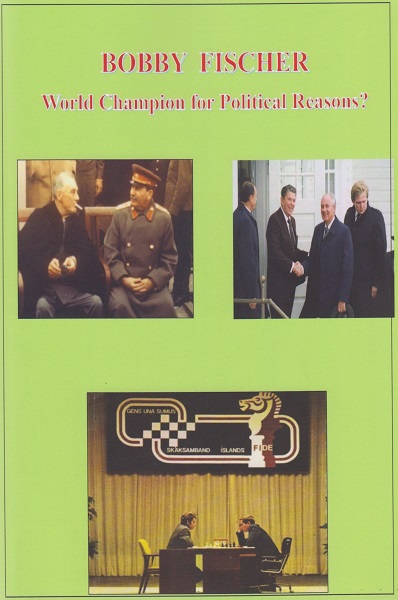
Apart from the ISBN number, 9781537399676, on the (blank) back cover, the sole bibliographical information about the book, whose pages are unnumbered, is in the bottom corner of the last page:
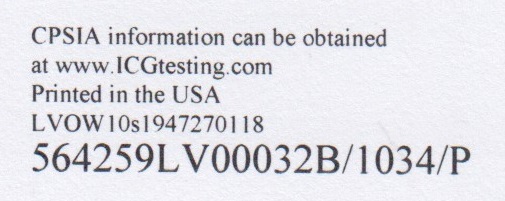
An author’s name is mentioned only on the title page, and not on the cover, but even the word ‘author’ is an exaggeration, because the book is essentially an omnium gatherum of other people’s writings. The early part lifts chunks from, among other publications, the Everyman Chess edition of Russians versus Fischer by D. Plisetsky and S. Voronkov (London, 2005), and a small example shows the literary and presentational skills of Julio Hidalgo:
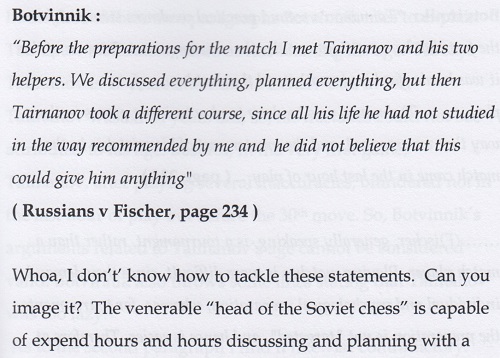
Later, it is Kasparov’s Predecessors work which dominates. Dozens of pages reproduce his text, with minimal linking material. For instance:
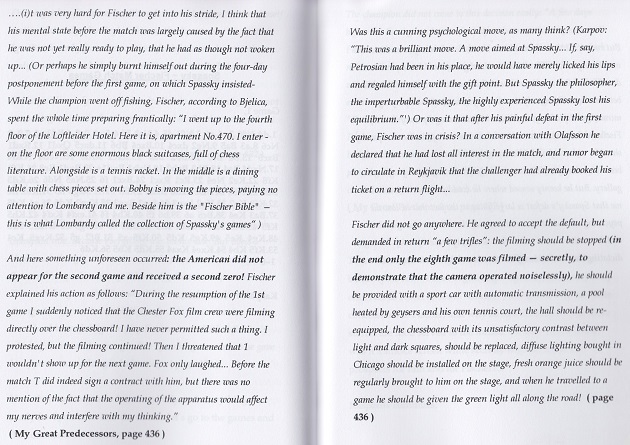
Another chapter, over half-a-dozen pages long, consists almost exclusively of text from Kasparov’s Child of Change. Euwe is a casualty too.
Towards the end of the book a chapter entitled ‘A Spassky Interview’ begins:
‘I have selected some paragraphs of [sic] an interview to [sic] Spassky, for Kingpin Magazine ...’
The ‘some paragraphs’ occupy six pages.
Garry Kasparov remains the chief victim of the Fischer book, but in any such case what chance of corrective action exists? How one longs for Kasparov to take a public stand, also supporting fellow victims of rapacity.
(10732)
See too Reflections on Garry Kasparov.
To the Chess Notes main page.
To the Archives for other feature articles.
Copyright: Edward Winter. All rights reserved.